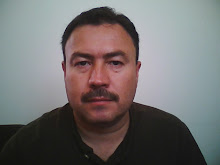
Cesar M Duran Ministry Missionary of General Board of Global Ministries of the United Methodist church serving in the Rocky Mountain Conference, called to develop leaders and serve God. Cesar M Duran MInistry Misionero de la Junta General de Ministerios Globales de la Iglesia Metodista Unida sirviendo en la Conferencia de Rocky Mountain llamado a desarrollar lideres y a servir a Dios
Datos personales

- CesarMDG
- Since he was six years old, he grew up in the Methodist Church in Piedras Negras, Mexico. He was one of the founders of the Youth League in the early 80's. After several years in the youth leadership of the league and the Youth district, God called him to the ministry entering the seminary even with 17 years old. In 1992, He graduated of BA in theology at the John Wesley Methodist Seminary in the City of Monterrey. In 1991 he started his studies in the Methodist Conference and was ordained elder in 1995. He has studied many courses in theology, pastoral care and received his certification as a chaplain. It has over two decades of experience in pastoral work in northern Mexico and the United States. He has been teacher of conferences and trainer of many courses to pastors, and a enthusiastic preacher in the U.S. and Mexico. Always preaching the gospel and leading the Latin people to serve God through the gifts and ministries that God has given to His Church.
LLamado
God called me to train and develop better leaders and ministries to serve better the Church of Jesus Christ. The Church is called to serve and ministry this world that is in crisis. To accomplish this task, every believer has a responsibility to be perfected to the praise of God. Leadership development requires sustained commitment even greater than that existing in a process of discipleship. My hope is that this blog help you in this process, your growth and your service to God.
Mira que te mando que te esfuerces y seas valiente; no temas ni desmayes, porque Jehová tu Dios estará contigo dondequiera que vayas. Josue 1:9
lunes, 30 de abril de 2012
DuranCesar/Augustine Class/Reading Journal Week 6 “Augustine anti Manichean”
jueves, 12 de abril de 2012
DuranCesar/Augustine Class/Reading Journal Week 4 “Augustine as Preacher”
DuranCesar/Augustine Class/Reading Journal Week 4 “Augustine as Preacher”
As Harmless mentioned in the introduction words of this section about Preaching God incarnate, Augustine in this sermon 188 at Christmas day, he uses the beginning of gospel of John (one of his most used in his sermons) and talks about Jesus as the divine Word, emphasizing Jesus as Son of God. On the other side, he talks about Jesus as the Word made flesh, and emphasize his incarnation through the Virgin Mary.
I chose these two quotations because show us these two emphasis of Augustine’s sermon. The first one was about Jesus as Son of God. “Equal to and co-eternal with the father, the One in whom all things, visible and invisible, in heaven and on earth, were established, God and Word of God, Life and Light of Humanity” (p. 128). Here, Augustine shows an identical theologically perspective to our times: Jesus as Son of God and has existed with God since the eternity.
The second quotation is about Jesus incarnated, the Word made flesh. “It’s for this reason that we celebrate this day on which He deigned to be born of a virgin, a begetting which He himself caused people to narrate the story of” (p.129). Here Augustine is talking about Jesus incarnated and born trough a virgin; also it is the reason because we celebrate Christmas Day and we share that story to everyone around us.
I liked the position given by Augustine about the Virgin Mary, because he talked about the evangelical perspective we have in our days: Mary only was an instrument in the hands of God and after the birth of Jesus Christ, she was given to her spouse so that she is no longer virgin (p. 130). Augustine finished his sermon comparing this truth of the Virgin Mary with the Church, whom is not virgin any more because have found his husband in Jesus Christ.
This points of the Christology of Augustine connects Augustine to our times and theology. Since those times of Augustine, the theology has suffered many changes, additions, aberrations and mutations. Today is not easy to find a healthy theology in the churches around our neighborhoods. But Augustine gives us a healthy perspective about Jesus Christ: Truth Son of God and truth Son of Man.
When we have this perspective about Jesus, we consider his divinity and all the miracles He did because Jesus was showing the kingdom of God. And when we see the humanity of Jesus Christ, it’s important to consider his suffers as human, and his holiness because he lived without sins before God. Nor we can forget His incarnation through the Virgin Mary, and that is the reason because we celebrate Christmas Day.
Jesus Christ is the center of the church; He is the foundation of the church and its cornerstone. If we have a healthy perspective about Jesus, we could live as church enjoying the divinity of Jesus Christ and His salvation, because He is the Son of God. Also, we could live as church celebrating the love of God, “For God so loved the world that he gave his one and only Son, that whoever believes in him shall not perish but have eternal life” John 3:16.